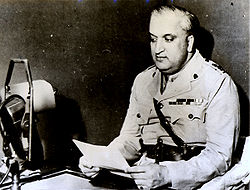Jammu
Jammu is a city in Jammu and Kashmir, India. It is on the banks of the Tawi River which is a tributary of the Chenab River. The Dogri language is spoken here alongside Hindi. The city is mostly populated by Hindus with a smaller minority of Sikhs and Muslims.[1]
|
जम्मू جموں Jammu Tawi | |
|---|---|
Capital city | |
| 250px | |
| Coordinates: 32°44′N 74°52′E / 32.73°N 74.87°ECoordinates: 32°44′N 74°52′E / 32.73°N 74.87°E | |
| Country | India |
| State | Jammu and Kashmir |
| District | Jammu |
| Settled | 2900 BC |
| Founded by | Raja Jambulochan |
| Government | |
| • Type | Municipal Corporation |
| • Body | Jammu Municipal corporation and Jammu Development Authority |
| Area | |
| • Total | 167 km2 (64 sq mi) |
| Elevation | 327 m (1,073 ft) |
| Population (2011) | |
| • Total | 651,826 (Municipal Corporation) 951,373 (Urban agglomeration) |
| • Rank | 2 |
| • Density | 5,697/km2 (14,760/sq mi) |
| Languages | |
| • Official | Urdu, Dogri |
| Time zone | UTC+5:30 (IST) |
| PIN | |
| Vehicle registration | JK 02 |
| Website | www |
There is an archeological site called Manda in Jammu.
Jammu Media
Maharaja Gulab Singh of Jammu and Kashmir
Maharaja of Kashmir, Hari Singh (1895 - 1961)
Aerial view of Jammu Tawi station
Singer Malika Pukhraj in 1920s
Plate Full of Famous Kalaadi of Ramnagar
This is a photo of ASI monument number
References
- ↑ "Introducing Jammu". Lonely Planet. Retrieved 23 January 2016.
Other websites
![]() Media related to Jammu at Wikimedia Commons
Media related to Jammu at Wikimedia Commons







